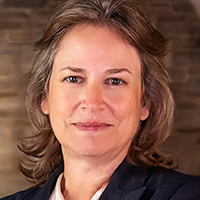 Emily Carter, University of California, Los Angeles
Emily Carter, University of California, Los Angeles
For advances in quantum mechanics theory with broad applications to materials and chemical sciences
Quantum-Derived Materials Solutions for a Sustainable Future
An
overview will be given of how quantum mechanics methods developed in the Carter group have been applied to a diverse array of sustainable energy challenges. The two most prominent methods, orbital-free density functional theory (OF-DFT) to embedded
correlated wavefunction (ECW) theory, overcome different limitations of Kohn-Sham DFT: computational cost and accuracy, respectively. OF-DFT molecular dynamics, for example, has been applied to study properties of liquid metals under consideration
for fusion reactor first wall materials. ECW theory has been applied to extract mechanistic insight into (photo)(electro) catalysis to produce fuels and chemicals from renewable energy. These methods, together with standard DFT-based methods, have
enabled the design and discovery of new materials for sustainable fuel, chemical, and electricity production, including inexpensive solar cells, solar thermochemical production of syn gas, electrochemical water splitting, (photo)(electro) chemical
carbon dioxide reduction, and more.
MRS acknowledges the generosity of Dr. Gwo-Ching Wang and Dr. Toh-Ming Lu
in endowing the Materials Theory Award.